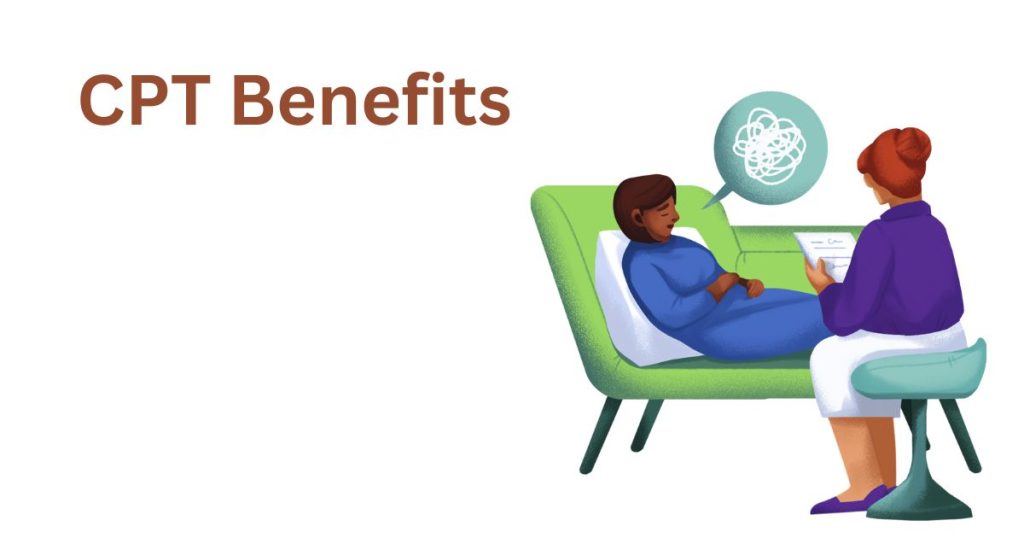In the realm of mental health, the quest for effective therapies is a perpetual pursuit. Cognitive Processing Therapy (CPT) has emerged as a powerful intervention that holds promise in treating various mental health conditions.
Drawing from cognitive-behavioral principles, CPT focuses on addressing the impact of traumatic experiences on an individual’s thoughts, emotions, and behaviors. CPT aims to empower individuals to regain control by challenging and reframing negative beliefs.
In this blog, we delve into the intricacies of CPT and explore its effectiveness in promoting mental well-being and resilience.
What is Cognitive Processing Therapy?

Cognitive Processing Therapy (CPT) is a structured and evidence-based therapeutic approach to treating individuals with post-traumatic stress disorder (PTSD). It addresses and challenges negative thought patterns and beliefs that develop from traumatic experiences.
CPT aims to help individuals understand how their thoughts impact their emotions and behaviors, providing them with the tools to reframe and reprocess their traumatic memories in a healthier way.
By working through the trauma and its associated cognitive distortions, CPT empowers individuals to develop new, more adaptive ways of thinking and ultimately reduce the distressing symptoms of PTSD.
Understanding the Basics of CPT
Cognitive Processing Therapy (CPT) is a therapeutic intervention designed to help individuals with post-traumatic stress disorder (PTSD) better understand and cope with their symptoms. How we think about and interpret traumatic events significantly influences our emotional and behavioral responses.
CPT involves structured sessions where individuals work with a therapist to identify and challenge unhelpful beliefs and thoughts about their trauma.
Individuals can develop more accurate and balanced perspectives by examining the evidence supporting or contradicting these beliefs. The ultimate goal of CPT is to reduce distressing symptoms by promoting cognitive restructuring and fostering healthier thinking.
How Cognitive Processing Therapy Works
Cognitive Processing Therapy (CPT) works by helping individuals with post-traumatic stress disorder (PTSD) process and reframe their traumatic experiences. The therapy typically involves 12 weekly sessions to identify and challenge maladaptive thoughts and beliefs related to the trauma.
Through various techniques, such as Socratic questioning and written exercises, individuals learn to examine the accuracy and usefulness of their thoughts. This process enables them to develop more balanced and realistic cognitions, reducing the emotional distress associated with the trauma.
CPT also encourages individuals to confront avoided emotions and engage in activities they have avoided due to the trauma. By addressing both cognitive and behavioral aspects, CPT aims to provide lasting relief from PTSD symptoms.
Benefits and Efficacy of CPT

Cognitive Processing Therapy (CPT) has demonstrated numerous benefits and high efficacy in treating post-traumatic stress disorder (PTSD).
Research has shown that CPT can effectively reduce the severity of PTSD symptoms, including intrusive thoughts, avoidance behaviors, and hyperarousal. It has also proven to improve overall functioning and quality of life.
CPT’s structured and evidence-based approach provides individuals with practical tools to challenge and reframe trauma-related negative thoughts.
By addressing the underlying cognitive processes, CPT helps individuals gain a new perspective, reduce distress, and restore a sense of control.
Various studies have supported its effectiveness, making it a recommended and widely used treatment for PTSD.
Who Can Benefit from Cognitive Processing Therapy?

Are you or someone you know struggling with the aftermath of a traumatic event? Cognitive Processing Therapy (CPT) might be the answer you’re looking for. CPT is a proven therapeutic approach designed to help individuals with post-traumatic stress disorder (PTSD) regain control over their lives.
Whether you’re a military veteran, a survivor of assault, or someone who has experienced childhood trauma, CPT can provide valuable tools to challenge negative thought patterns and foster healing.
In this section, we’ll explore who can benefit from CPT and how it can offer hope and a path towards recovery.
Individuals with Post-Traumatic Stress Disorder (PTSD)
Individuals grappling with post-traumatic stress disorder (PTSD) often find relief and healing through Cognitive Processing Therapy (CPT). CPT for PTSD offers a structured and evidence-based approach to help those struggling with the aftermath of trauma.
By addressing the cognitive distortions and negative thought patterns associated with PTSD, CPT enables individuals to reframe their experiences, develop a healthier perspective, and reduce distressing symptoms.
Military veterans, survivors of abuse or assault, accident survivors, and others affected by traumatic events can all benefit from CPT and PTSD online treatment. Through its focus on cognitive restructuring, CPT empowers individuals to regain control over their lives and embark on a journey toward recovery.
Trauma Survivors Seeking Healing and Recovery
Trauma survivors seeking healing and recovery can find substantial benefits in Cognitive Processing Therapy. CPT offers a safe, structured therapeutic approach that helps individuals process and reframe their traumatic experiences.
By challenging negative thought patterns and beliefs related to the trauma, CPT empowers survivors to regain control over their lives and reduce the distressing symptoms of post-traumatic stress disorder.
Whether someone has experienced abuse, violence, accidents, or other traumatic events, CPT provides valuable tools to navigate the aftermath and foster healing. It promotes resilience, empowers individuals, and supports their journey toward recovery and a brighter future.
Veterans and Military Personnel
Veterans and military personnel often face unique challenges related to their service, including post-traumatic stress disorder. Cognitive Processing Therapy has shown significant benefits for this population.
CPT provides a structured, evidence-based approach that helps veterans and military personnel reframe their traumatic experiences and manage PTSD symptoms. By addressing negative thoughts and beliefs about their service, CPT empowers individuals to regain control over their lives and improve their overall well-being.
It equips them with practical tools to challenge cognitive distortions and develop healthier perspectives, promoting healing, resilience, and a smoother transition to civilian life. CPT offers valuable support for those who have served their country and deserve effective and compassionate care.
The Process of Cognitive Processing Therapy
Embarking on the healing journey from trauma can be challenging, but Cognitive Processing Therapy for PTSD offers a structured process that can make a significant difference.
From understanding how thoughts impact emotions to identifying and challenging negative beliefs, CPT empowers individuals to reframe their experiences and find new perspectives.
Through guided exercises, writing trauma accounts, and developing coping strategies, CPT equips individuals with the tools needed for healing and recovery.
Join us as we delve into the transformative process of Cognitive Processing Therapy training and its potential for profound change.
Assessment and Formulation in CPT
Assessment and formulation are crucial components of Cognitive Processing Therapy (CPT). In the initial stages, a professional will conduct a thorough assessment to understand the individual’s trauma history, PTSD symptoms, and the impact on their daily functioning.
This assessment helps to tailor the therapy to their specific needs. Following the assessment, the trained professional will develop a formulation, which involves identifying the individual’s maladaptive beliefs, cognitive distortions, and avoidance behaviors.
The formulation serves as a roadmap for therapy, guiding the therapist and individual in targeting specific areas for cognitive restructuring and processing. Assessment and formulation lay the foundation for effective treatment and ensure that CPT tailors to address each individual’s unique experiences and challenges.
Cognitive Restructuring Techniques
Cognitive restructuring techniques are essential to Cognitive Processing Therapy (CPT) to challenge and modify negative thought patterns. These techniques help individuals replace unhelpful and distorted thoughts with more accurate and balanced ones.
Common cognitive restructuring techniques include identifying and questioning automatic negative thoughts, examining the evidence supporting or contradicting those thoughts, considering alternative perspectives, and generating more adaptive and realistic interpretations of the traumatic event.
By actively engaging in cognitive restructuring, individuals can gradually reframe their beliefs, reduce distressing symptoms, and promote healthier thinking. These techniques empower individuals to regain control over their thoughts and emotions, fostering healing and recovery.
Gradual Exposure and Desensitization
Gradual exposure and desensitization are essential techniques in Cognitive Processing Therapy to address avoidance behaviors and reduce the distress associated with traumatic memories. Through systematic and controlled exposure, individuals gradually confront the feared situations, thoughts, or memories they have avoided.
Cognitive process therapy allows them to develop a sense of safety and mastery over trauma-related triggers.
As individuals repeatedly confront these stimuli in a supportive environment, their emotional and physiological responses gradually diminish, leading to desensitization. Gradual exposure and desensitization help individuals regain control over their lives by reducing avoidance and fostering a sense of empowerment and resilience in the face of trauma.
Identifying and Challenging Negative Thoughts and Beliefs
Cognitive Processing Therapy CPT process involves actively examining thoughts and beliefs contributing to distressing emotions and behaviors. Individuals learn to identify cognitive distortions such as black-and-white thinking, overgeneralization, and personalization.
They then engage in a collaborative effort with their therapist to challenge and reframe these negative cognitions. Individuals can develop more balanced and realistic perspectives by evaluating the evidence for and against these thoughts.
This process allows for a shift in thinking patterns, empowering individuals to reduce self-blame, guilt, and shame associated with trauma and promoting a greater sense of self-compassion and resilience.
Cognitive Processing Therapy Online
CPT Cognitive Processing Therapy is a powerful and effective therapeutic approach for individuals struggling with post-traumatic stress disorder (PTSD) and the aftermath of trauma.
Through its structured process of cognitive restructuring, gradual exposure, and challenging negative thoughts, cognitive processing therapy online training helps empower individuals to reclaim control over their lives and foster healing and recovery.
Take the first healing step by contacting Burns Virtual Psychological Solutions to guide you through this evidence-based therapy. Start your journey toward a brighter future today!









